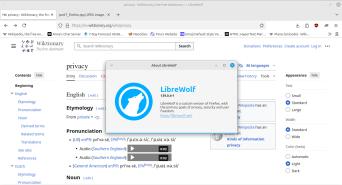



LibreWolf is a fork of Mozilla Firefox, focussed on preserving your privacy online. In terms of general use, it's not all that different from other web browsers— type address or search term in search bar, press enter, click to go, that sort of thing.
In software, a fork is an alternative version of an open-source codebase, using the original codebase as a starting point. Mozilla put the source code for Firefox Browser under an open-source license, allowing people to copy it, build upon it, and re-implement it under a different project. LibreWolf is actually just one of several projects forked from Firefox browser, the others being Palemoon and Waterfox.
Large corporations have several tools they use to track users across the internet and make determinations about the hardware being used to access data. While tracking pixels, cookies, and other purpose-built spyware are the best-known, there are other tracking methodologies that allow the corporation to work around the most common forms of tracker blocking, such as canvas fingerprinting and flaws inherent in JavaScript
and flaws inherent in JavaScript . LibreWolf has been pre-configured to mitigate most forms of browser fingerprinting by disabling settings that are typically set to "enabled" in most implementations of Firefox Browser.
. LibreWolf has been pre-configured to mitigate most forms of browser fingerprinting by disabling settings that are typically set to "enabled" in most implementations of Firefox Browser.
Also— and here's the big one— LibreWolf has no generative AI integration. Mozilla integrated an AI chatbot into v.135 of the Firefox Browser's desktop version, which makes it undesirable from a privacy standpoint. It is not possible to train a large-language model locally in most cases, therefore the implication is Firefox now exports all your data to an offsite datacentre for analysis and systems training. We've been over this before. While it remains to be seen if this change will be added to the mobile version of the browser, I can't in good conscience recommend Firefox anymore.
Fortunately, as LibreWolf is a fork of Firefox, very little needs to change about how to approach this browser or how to use it.
The big thing people worry about when it comes to switching browsers is "will I be able to save my bookmarks, saved logins, and open tabs?" To do this in Librewolf, open a Librewolf browser window and either press ALT on the keyboard, or right-click in the space where the tabs show up and select "Menu bar". Under File, select "Import from another browser", then find the name of the browser you want to import from and select Next to choose what data you want imported; Cookies, Browsing history, Saved passwords, and Favourites.
Saved. That was easy. Now you can uninstall Brave without remorse.
You've got to use Add-ons and Extensions to get the full experience. Librewolf is fully compatible with all of the add-ons available from Mozilla's website; all of which are free and most will safeguard your personal data. If you're familiar with Google Chrome extensions, then there won't be a learning curve.
In a Librewolf browser window, type the following into the search bar...
about:addons
This will open your add-ons settings menu from where you can control, update, and remove add-ons that you have installed, and search for new add-ons. At the very bottom of the page is a button marked "Find more add-ons", which will take you to Mozilla's Firefox Browser Add-ons homepage. Have a look around, see what looks interesting, give it a go. Most add-ons won't require you to restart Librewolf, but if they do, the browser will save your history and any website logins to restore your session.
There are a few add-ons I would recommend installing immediately after setting up Librewolf for the first time, all are related to privacy (Librewolf is already the most secure browser in the world, these just plug any holes that might show up later).
uBlock Origin. This addon is actually pre-installed in Librewolf and pre-configured for most use cases. It behaves exactly the same way as the Firefox version.
LocalCDN. It's Decentraleyes on steroids. Its sole focus is emulating corporate content delivery networks (CDNs) without actually accessing them, adding an extra layer of privacy as most CDNs are able to personally identify your computer based upon the content it requests. This reduces their ability to profit off your existence while still allowing you to use the internet as normal. It's a large install— 17 GB— because it doesn't rely on offsite resources to do its job. That's why it's called "Local" CDN. Everything is carried out on your computer, and nowhere else.
Privacy Badger. Another trackware blocker, made by the Electronic Frontier Foundation. This one is different from uBO in that it can pick up on new trackers that people who make uBO lists may not know about yet, by analysing the behaviour of the website and any scripts it runs. Basically, it does what trackers do, but it does it to the tracker instead of the user. This next one isn't related to privacy, but...
SingleFile. Are you given to datahoarding? Good on you! So am I. If you want to hoard webpages, SingleFile can condense a webpage into a single HTML document for easy storage.
DownThemAll. If you're not interested in downloading the webpage, just the media on the page, DownThemAll can do that. Either you can tell DTA the kinds of files you want to nick from a page, or you can create a download queue by giving DTA the links to things you want to download.
Your mom and grandma will tell you about the days when you could get malware just by clicking onto a shady-looking website. One of the things that Mozilla is known for is offering a bounty for any security vulnerabilities in Firefox. Rather than trying to predict all possible attack vectors themselves, they offer money and a teeshirt to hackers who can provide methods for breaching a computer's security using Firefox. As a result, Firefox-fork, Librewolf, is quite possibly the most secure browser ever to exist in the history of computing. You can't get viruses by just going to a website anymore, though you will still need to exercise a bit of common sense when you download software. Librewolf can't protect you from malware that you intentionally, willfully install on your own computer (including self-professed corporate spyware, like Google Earth and EA Desktop).
If you're serious about privacy, all of this can take you pretty far, but, it won't protect you against thieves who just straight up steal your computer. As a certifiable paranoid freak, I'm aware that I live in a world full of people who might just walk right up and whisk my laptop away while I'm drinking my coffee. You really should consider not leaving tabs open or staying logged in across multiple sessions. I know there are certain extenuating circumstances; like work or school assignments; but for just general use, consider changing the settings to make Librewolf delete your cache automatically when you close the browser.
It's selective; you can tell it what data to delete and what to preserve; but at the very least allow Firefox to log you out of websites when you close it. In the search bar type...
about:preferences
...and navigate to the "Privacy & Security" tab, then scroll down to "Cookies and Site Data" and check the box that says "Delete cookies and site data when LibreWolf is closed". If you have a website that you want exempted from this rule, such as Tumblr for instance, click "Manage exceptions" and enter Tumblr's URL into the text line, and click "Allow". If you change your mind later, you can delete it from the list.
Next, scroll down to "History" and change it to "Clear history when LibreWolf closes". If you want to stay logged into websites, retain content settings, or other things that are stored in local cookies instead of on the host server, click "Settings", and check or uncheck the boxes next to the desired items.
Librewolf has loads of built-in customisation options, such as font overrides, light mode and dark mode, and themes, so have a look around.